osx
Fate of the World
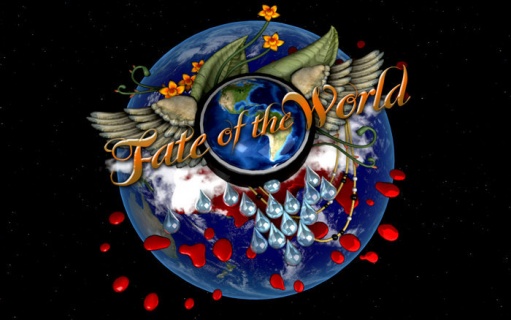 If you were born in the 1980s, you may have grown up like us playing The Oregon Trail, Number Munchers, and Where in the World is Carmen Sandiego? in school. Educational games disguised as entertainment were probably some of the most effective forms of lazy teaching. Personally, The Oregon Trail and Carmen Sandiego improved my geography knowledge and sparked an interest in history, and Number Munchers obviously helped my mathematical skills. Whether I wanted to or not, I was still learning, even in the computer lab.
If you were born in the 1980s, you may have grown up like us playing The Oregon Trail, Number Munchers, and Where in the World is Carmen Sandiego? in school. Educational games disguised as entertainment were probably some of the most effective forms of lazy teaching. Personally, The Oregon Trail and Carmen Sandiego improved my geography knowledge and sparked an interest in history, and Number Munchers obviously helped my mathematical skills. Whether I wanted to or not, I was still learning, even in the computer lab.
But I have no idea what kids do or play now in computer labs. Probably check their Facebook or Twitter, maybe play some flash games, but I doubt most of it has an ounce of educational value. But maybe a game like Fate of the World has found its way into some programs, I know for a fact that Positech Games has landed deals with some institutions to deliver their Democracy series to students, so it's not unlikely a climate change/general-bad-things-are-happening-everywhere simulator could be being played in high schools right now.
It's been a while since our last Indie Impression, but it's a column I'd really like to continue. Independently developed games are becoming more and more important with every year, Steam update, and console release. Highlighting one or two a month shouldn't be difficult, and I believe important to the industry. Let's take a look at Fate of the World, today.
Tales of Monkey Island: Rise of the Pirate God
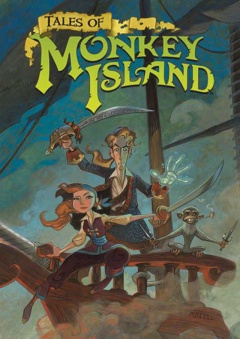 As the first Monkey Island game in nine years, fans had high expectations for Tales of Monkey Island. Not only is the series one of those coveted, highly nostalgialized, fan favorites from our youth, but the last game, Escape from Monkey Island, simply wasn’t that good. There were a lot of questions whether Guybrush Threepwood is even funny in three dimensions as it had been tried and failed once already.
As the first Monkey Island game in nine years, fans had high expectations for Tales of Monkey Island. Not only is the series one of those coveted, highly nostalgialized, fan favorites from our youth, but the last game, Escape from Monkey Island, simply wasn’t that good. There were a lot of questions whether Guybrush Threepwood is even funny in three dimensions as it had been tried and failed once already.
I certainly had my doubts, I had never played an episodic game before Tales of Monkey Island, so even the delivery method was questionable. I know that TellTale Games has had great success with season gaming, but would it work with Monkey Island? Would the episodes be too long? Too short? Too reliant on cliffhangers? Could a writing staff still capture Guybrush, Elaine, and Chuck?
Five episodes later, I have my definitive answer to all of these questions. Rise of the Pirate God serves as not only the finale for the season, but once again, could be the final chapter in Monkey Island’s 20 year history. Let’s talk first about the episode, and then the series as a whole.
Tales of Monkey Island: The Trial and Execution of Guybrush Threepwood
 After the excellent Lair of the Leviathan episode, I was totally expecting the quality to fall in back to Tales of Monkey Island’s previous levels, good comedy, but not Monkey Island comedy. Thankfully, The Trial and Execution of Guybrush Threepwood manages to sustain most of the momentum of Leviathan in a well written romp that sets out a few pretty unique puzzles for our hero.
After the excellent Lair of the Leviathan episode, I was totally expecting the quality to fall in back to Tales of Monkey Island’s previous levels, good comedy, but not Monkey Island comedy. Thankfully, The Trial and Execution of Guybrush Threepwood manages to sustain most of the momentum of Leviathan in a well written romp that sets out a few pretty unique puzzles for our hero.
So far I’ve really been enjoying Tales of Monkey Island, it isn’t as good as the first three games in the series, but is really well done as an episodic adventure. Breaking out the island hopping into their own chapter has always fit well with Monkey Island, and allows the writers to create more natural cliffhangers and mini-conclusions.
The Trial and Execution of Guybrush Threepwood features a few of its own surprises, which I’ll definitely spoil in the following few paragraphs, if you’re reading this far I guess I’m assuming you’ve either already played the season or don’t care about spoilers at this point.
Tales of Monkey Island: Lair of the Leviathan
 Finally, a hilarious, superbly written, well-rounded entry into Tales of Monkey Island. The first two episodes felt like Monkey Island on the surface, but were lacking in key areas. Lair of the Leviathan may well be the smallest scoped chapter so far, but is highly focused and downright entertaining from beginning to end.
Finally, a hilarious, superbly written, well-rounded entry into Tales of Monkey Island. The first two episodes felt like Monkey Island on the surface, but were lacking in key areas. Lair of the Leviathan may well be the smallest scoped chapter so far, but is highly focused and downright entertaining from beginning to end.
Lair of the Leviathan is the middle child of the series, and TellTale Games could have certainly phoned the it in; most gamers playing this far are probably in it for the long haul, and with an explosive ending in mind, we would have forgotten the stuff in between point A and point B. But writer Sean Vanaman brought the goods and we got a memorable treat.
As I write this, The Walking Dead series from TellTale Games is receiving rave reviews for its own third episode, and while part of me wishes I was keeping up with that series instead of diving into Tales of Monkey Island, I’m very happy to finally be playing the three year old game in one of my favorite series of all time. Better late than never.
Tales of Monkey Island: The Siege of Spinner Cay
 Tales of Monkey Island is my first foray into episodic gaming, but considering the season was finished nearly three years ago, I’m not exactly playing the game as it was originally intended. But considering plenty of people see blockbusters for the first time outside the theater, television seasons are consumed in two or three sittings, and classic rock albums are downloaded one song at a time, it should be expected that good media is good media no matter how it’s delivered.
Tales of Monkey Island is my first foray into episodic gaming, but considering the season was finished nearly three years ago, I’m not exactly playing the game as it was originally intended. But considering plenty of people see blockbusters for the first time outside the theater, television seasons are consumed in two or three sittings, and classic rock albums are downloaded one song at a time, it should be expected that good media is good media no matter how it’s delivered.
Now that I’m used to the controls and inventory system, my experience with the second episode went a lot smoother. I’m still feeling a bit underwhelmed by the whole thing, however, but have come to the conclusion that the episodic delivery is a good mechanism for not only Monkey Island, but the point and click adventure genre as a whole.
Siege of Spinner Cay kicks off, unsurprisingly, right where Launch of the Screaming Narwhal ended. TellTale Games squeezed in a little cliffhanger at the end of episode one to remind you not everything is okay, and honestly, it immediately pays off.
Trine 2
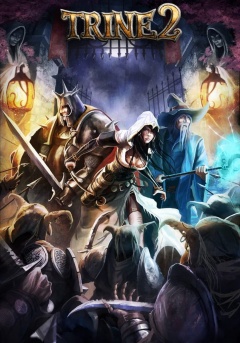 Growing up, playing a game cooperatively usually meant sitting down
with a friend in front of my NES playing Contra, Teenage Mutant Ninja
Turtles, or Chip 'n Dale Rescue Rangers. The game was either made easier
with a second player (twice as many bullets!), or twice as hard (fellow
chipmunks can be used as weapons!). But as games have evolved from the
living room to the internet, cooperative play has changed too.
Growing up, playing a game cooperatively usually meant sitting down
with a friend in front of my NES playing Contra, Teenage Mutant Ninja
Turtles, or Chip 'n Dale Rescue Rangers. The game was either made easier
with a second player (twice as many bullets!), or twice as hard (fellow
chipmunks can be used as weapons!). But as games have evolved from the
living room to the internet, cooperative play has changed too.
Portal 2 was designed with two campaigns in mind, one for the single player and the other for multiplayer, specifically a cooperative experience with no traditional way to communicate available. Both sets of levels were brilliant in their own right, and excelled in creating a unique undertaking. On the other hand, the original Trine was made for local gaming only. Friends gathered in front of the TV or monitor and lead the trio of heroes on their adventure.
Trine 2 introduces online co-op for up to three gamers, fixes many complaints from the first game, and features some of the most gorgeous graphics I've ever seen in a video game. I finally got to tax my video card. Steve and I played through the entire game together online without voice communication, here are our thoughts.
Tales of Monkey Island: Launch of the Screaming Narwhal
 After 2000’s somewhat disastrous Escape from Monkey Island, I was rather leery on returning to my beloved childhood point and click adventure series. Monkey Island 2: LeChuck’s Revenge was the first game I ever played in the genre, and The Curse of Monkey Island is still in my top 10 games of all time.
After 2000’s somewhat disastrous Escape from Monkey Island, I was rather leery on returning to my beloved childhood point and click adventure series. Monkey Island 2: LeChuck’s Revenge was the first game I ever played in the genre, and The Curse of Monkey Island is still in my top 10 games of all time.
LucasArts wasn’t too excited on bringing back Guybrush Threepwood either, but in 2009 thanks to TellTale Games, began publishing the five episodes of Tales of Monkey Island, beginning with Launch of the Screaming Narwhal. TellTale Games is the most successful episodic gaming developer around, and they seem to thrive when given an existing IP to adapt into their release format. Tales of Monkey Island would go on to become their best-selling series at the time.
I’ll be reviewing each episode individually as if they were being released one at a time. There’s a few reasons for this: if an episode really sucks, will I want to play on? I like the idea of being able to quit at any time. Plus, I’m a big fan of getting my ideas down on paper sooner than later, and feel like I can give each episode the time it deserves by reviewing it immediately.
Bastion
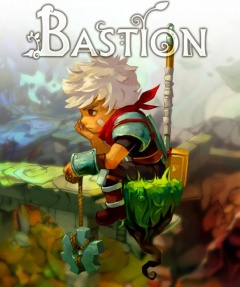 Bastion made a huge splash last year when it was released on Xbox Live Arcade and Steam, reaping excellent critical reviews and huge sales, especially for an indie game. Developed by Supergiant Games and published by Warner Bros., the game’s iconic narrator and haunting soundtrack have cemented its place as one of the cornerstone independent games of this decade.
Bastion made a huge splash last year when it was released on Xbox Live Arcade and Steam, reaping excellent critical reviews and huge sales, especially for an indie game. Developed by Supergiant Games and published by Warner Bros., the game’s iconic narrator and haunting soundtrack have cemented its place as one of the cornerstone independent games of this decade.
I was impressed by its first hour last November, but reading my thoughts on Bastion’s start indicates a trend that would hold throughout the game: while the art, music, and voice acting is stellar, the gameplay is just sort of there. It’s solid, but didn’t stand out amongst the great presentation.
It took a few months and many, many games, but I returned to Bastion, restarted my adventure, and finished the game in a half-dozen sittings. Here’s my review of Bastion for the PC.
Wizorb
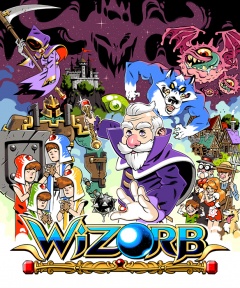 Breakout and Arkanoid and similar paddle games never resonated with me. Maybe because their Atari heyday ended before I started playing games, or maybe because I disliked the loose shot control. Whatever the case, the genre’s most polished and inspired entries still manage only a passing fancy.
Breakout and Arkanoid and similar paddle games never resonated with me. Maybe because their Atari heyday ended before I started playing games, or maybe because I disliked the loose shot control. Whatever the case, the genre’s most polished and inspired entries still manage only a passing fancy.
So I’m flummoxed by my lingering affinity for Wizorb, a three-dollar, three-hour curiosity. I completed the brief game in a weekend fling and have no real desire to revisit it, yet it’s still on my mind. I do relish the lively lo-fi style and RPG window dressing, but the game is still a pretty standard brick breaker at its core.
I’m not terribly impressed by this new appstore era, this flood of amateur developments selling for less than a vending machine lunch and rarely lasting as long. But Wizorb is one of the few $3 games that’s more filling than its price tag and play time imply. A few thoughtful little gameplay functions that address the genre’s weaknesses are what make it shine among its Breakout-clone peers and its bottom-dollar indie competition both.
VVVVVV
![]() I’ve been on an indie game kick this year, playing some really excellent platformer and adventure games. In a somewhat random string of events, I ended up playing three pretty different types of platformers over the course of a few weeks, and in preparation for our recent five year anniversary celebration, all full reviews were put on the back burner.
I’ve been on an indie game kick this year, playing some really excellent platformer and adventure games. In a somewhat random string of events, I ended up playing three pretty different types of platformers over the course of a few weeks, and in preparation for our recent five year anniversary celebration, all full reviews were put on the back burner.
The first of these three is VVVVVV, developed by Terry Cavanagh and released in early 2010, VVVVVV is a short but challenging open world platformer. Our hero, Captain Viridian, suffers some kind of accident to his spaceship and his crew is scattered across a new dimension. The controls are simple: all you can do is move left, right, and well, flip the gravity at your whim.
The next two platformers you’ll hear from me about are NightSky and Bit.Trip Runner, and while they’re all technically rather distinct, they can, after all, be boiled down to 2D platformers at the core.
